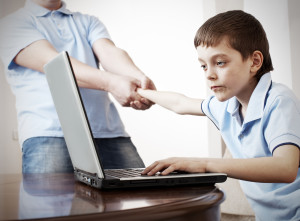I have been a therapist in private practice for almost twenty eight years. As they say, things sure have changed. The parental complaint of “I can’t get my child to clean his room” has been replaced with “I can’t get my child off the computer, smart phone, video game, YouTube, texting and/or social media.”
It seems that we are in collective denial about the addictive quality of modern day electronics and the reality that many children have more screen time than any other activity. This includes face to face interaction with peers and adults.
When parents attempt to get their children to reduce or eliminate electronic use, kids have reactions that are similar to drug withdrawal: mood swings, restlessness, angry outburst, unusual oppositional behavior, lack of interest in any activity that doesn’t require a device with a illuminating screen.
Recent research has identified the following disturbing trends: Violent game use leads to lack of empathy. Too much screen time causes children to not recognize non-verbal cues such as facial expressions. It also leads to increased obesity, sleep disorders, and increased mental health disorders such as depression, anxiety, impulsivity and hyperactivity. Researchers have defined too much screen time as more than two hours per day.
There are also studies that state that increased screen time decreases the brain’s gray matter. The gray matter which includes the frontal lobe area of the brain is responsible for executive functioning that includes planning, organizing and impulse control.
It is my opinion based on my interaction with children and teens that the over reliance on computers, smart phones, tablets, etc. has created a large segment of young people who don’t know how to persevere when school assignments become outside of their comfort zone.
If they have a homework project that requires more than googling or asking siri for the correct answer, many of these kids become overwhelmed at their own confusion and uncertainty. Instead of struggling with the assignment and attempting to think about the possibilities that the lesson is seeking, the young person will halt his work. He will say that the assignment is too difficult when in reality, it is the child’s/teen’s lack of tolerance for uncertainty that is the problem here.
The overuse of screen time has created this crisis where the mere function of thinking becomes overwhelming for young folks. They have been programed by these devices to believe that instant gratification is the expectation and therefore demanded at all times.
The art of processing information; weighing the pros and cons of opposing arguments of an issue; wondering how others feel about the issue, being able to experience a myriad of emotions about the issue is totally lost to young folks. Processing is a necessary, acquired skill that seems to be irrelevant to these kids.
They cannot tolerate any presented material that is ambiguous or confusing. They have zero tolerance for frustration and the value of putting in long hours and effort to understand and complete a project is dying on the vine.
This phenomena has nothing to do with the lack of intelligence. Most of the children I have met who have perseverance deficit are very bright. I believe that that too much screen time somehow changes their brain chemistry causing critical thinking skills to diminish and maybe disappear altogether.
This is a huge crisis because these young folks will be in positions one day of running the country and the world. How can those who lack empathy, patience, tolerance for frustration, and don’t see the reason or have the inclination for problem solving skills supposed to lead?
It seems that children mostly communicate with peers and adults through texting. This creates a large portion of Americans that has no real clue of the nuances of face to face communication, understanding and working through conflict and comprehension of non-verbal cues such as body language.
It is very difficult for parents to manage their kid’s screen time because of work and other major responsibilities. It is my opinion that most children who are unsupervised will be unable to manage their screen time and therefore will be online endlessly.
Most schools require children to have computer access to complete homework assignments. This makes it complicated and time consuming for parents to monitor screen time if their children tell them they are working on a school project. Children become adept at hiding what other online activity they are focusing on and parents have to be clever to catch them at not doing their school work.
If you as parents can monitor your child’s screen time usage and insure that she be on the device no more than two hours per day; you may feel that this a solution to this crisis. However we aren’t sure if future research will indicate that the standard of too much screen time will be less than two hours per day. It also would be unrealistic to expect that parents can devote the time required to oversee this operation. It would be unwarranted to allow your child two hours of screen time during an already packed weekly schedule. This amount of screen time would take away from the possibility of having face to face time with your children.
It is my opinion that this situation is so serious that it is time to consider having a screen free household. You as parents cannot accomplish this on your own. You will have to organize with other parents in order to support each other. The schools will have to hear your voices about not involving computers for homework assignments or other projects. Kids will have to go to the library and seek information in actual books and write down their assignments using paper and pencil. Yes, real old school!
I believe this screen time crisis is only going to get worse as time goes on. The fight is on for the hearts, minds and souls of our children. Their thinking, feeling and processing skills are all at risk and are in danger of becoming obliterated. Please let me know what you think below and on Facebook.
Bob Livingstone’s latest book is here.



Leave a Reply